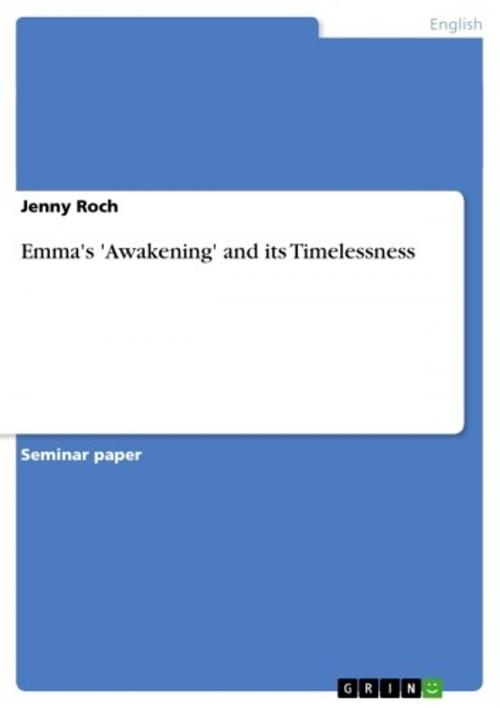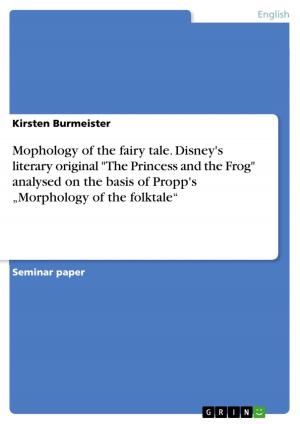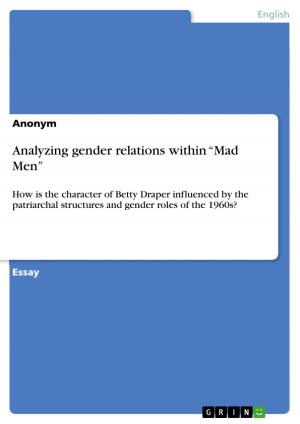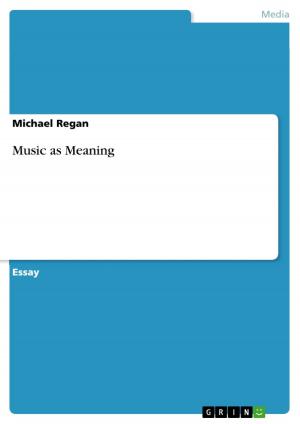| Author: | Jenny Roch | ISBN: | 9783638456661 |
| Publisher: | GRIN Publishing | Publication: | January 17, 2006 |
| Imprint: | GRIN Publishing | Language: | English |
| Author: | Jenny Roch |
| ISBN: | 9783638456661 |
| Publisher: | GRIN Publishing |
| Publication: | January 17, 2006 |
| Imprint: | GRIN Publishing |
| Language: | English |
Seminar paper from the year 2005 in the subject English Language and Literature Studies - Literature, grade: 17/20, University of Glasgow (Department of English Literature), course: Romanticism - Module 16 - University of Glasgow, 8 entries in the bibliography, language: English, abstract: This essay will focus on why and how the heroine of the eponymous novelEmmaundergoes a development in her character and how she comes to be, at the end of the novel, more mature than at the beginning. Emma's situation in life is disclosed on the very first page of the novel. Miss Woodhouse is 'handsome, clever, and rich, with a comfortable home and a happy disposition'6. Throughout the chapter, the reader learns that her father is a 'nervous man, easily depressed, [...] of gentle selfishness'7. Their situation of just having lost 'poor Miss Taylor' is described as an enormous loss, to both father and daughter. The narrator, for his part, enables the reader from the very start to eye Emma critically, as he deems the 'real evils of [her] situation ... the power of having too much her own way, and a disposition to think a little too well of herself'. However, 'the danger [of this is] ... unperceived'10by Emma, and the narrator makes it clear from the very first page that the reader can expect at least some of the action of the novel to stem from this weakness, and that it is on this blindness that the further development of Emma's character will always depend. Instead of getting herself involved in a romantic relationship, she makes them for others. In the very first chapter, after the wedding of Miss Taylor and Mr Weston, she proudly proclaims that she 'made the match [her]self', but after some rebuke from Mr Knightley, who suspects it to be a fantasy in her head that happens to have come true, Emma has to yield to the fact that it was indeed a 'lucky guess'. But Miss Taylor is indeed now Mrs Weston, and Emma sees this as a success good enough to encourage her to continue with her 'talent'. Her next object, or should one say victim, unlucky enough to taste the ambition of Emma's heart, is Harriet Smith, an orphaned young lady, who lives in Mrs Goddard's boarding school.
Seminar paper from the year 2005 in the subject English Language and Literature Studies - Literature, grade: 17/20, University of Glasgow (Department of English Literature), course: Romanticism - Module 16 - University of Glasgow, 8 entries in the bibliography, language: English, abstract: This essay will focus on why and how the heroine of the eponymous novelEmmaundergoes a development in her character and how she comes to be, at the end of the novel, more mature than at the beginning. Emma's situation in life is disclosed on the very first page of the novel. Miss Woodhouse is 'handsome, clever, and rich, with a comfortable home and a happy disposition'6. Throughout the chapter, the reader learns that her father is a 'nervous man, easily depressed, [...] of gentle selfishness'7. Their situation of just having lost 'poor Miss Taylor' is described as an enormous loss, to both father and daughter. The narrator, for his part, enables the reader from the very start to eye Emma critically, as he deems the 'real evils of [her] situation ... the power of having too much her own way, and a disposition to think a little too well of herself'. However, 'the danger [of this is] ... unperceived'10by Emma, and the narrator makes it clear from the very first page that the reader can expect at least some of the action of the novel to stem from this weakness, and that it is on this blindness that the further development of Emma's character will always depend. Instead of getting herself involved in a romantic relationship, she makes them for others. In the very first chapter, after the wedding of Miss Taylor and Mr Weston, she proudly proclaims that she 'made the match [her]self', but after some rebuke from Mr Knightley, who suspects it to be a fantasy in her head that happens to have come true, Emma has to yield to the fact that it was indeed a 'lucky guess'. But Miss Taylor is indeed now Mrs Weston, and Emma sees this as a success good enough to encourage her to continue with her 'talent'. Her next object, or should one say victim, unlucky enough to taste the ambition of Emma's heart, is Harriet Smith, an orphaned young lady, who lives in Mrs Goddard's boarding school.















